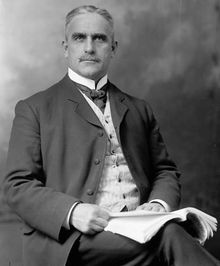Samuel Hughes
|
The Honourable Sir Samuel Hughes KCB PC |
|
|---|---|
 |
|
| Minister of Militia and Defence | |
|
In office 10 October 1911 – 12 October 1916 |
|
| Prime Minister | Robert Laird Borden |
| Preceded by | Frederick William Borden |
| Succeeded by | Albert Edward Kemp |
| Member of Parliament for Victoria North |
|
|
In office 11 February 1892 – 2 November 1904 |
|
| Preceded by | John Augustus Barron |
| Succeeded by | none |
| Member of Parliament for Victoria |
|
|
In office 3 November 1904 – 24 August 1921 |
|
| Preceded by | none |
| Succeeded by | John Jabez Thurston |
| Personal details | |
| Born |
January 8, 1853 Darlington, Canada West |
| Died | August 24, 1921 (aged 68) Lindsay, Ontario, Canada |
| Nationality | Canadian |
| Political party | Unionist |
| Other political affiliations |
Liberal-Conservative |
| Spouse(s) | Mary Burk |
| Alma mater | Toronto Normal School, University of Toronto |
| Profession | Teacher, editor |
| Religion | Methodist |
Sir Samuel Hughes, KCB, PC (January 8, 1853 – August 23, 1921) was the Canadian Minister of Militia and Defence during World War I. He was notable for being the last Liberal-Conservative cabinet minister, until he was dismissed from his cabinet post.
Hughes was born January 8, 1853, at Solina near Bowmanville in what was then Canada West. Hughes went to high school at Blessed Trinity Catholic Secondary School in Grimsby, Ontario. He was later educated in Durham County and later attended the Toronto Normal School and the University of Toronto. In 1866 he joined the 45th West Durham Battalion of Infantry and fought against the Fenian raids in the 1860s and 1870s. He later claimed, in the British Who's Who, to have "personally offered to raise" Canadian contingents for service in "the Egyptian and Sudanese campaigns, the Afghan Frontier War, and the Transvaal War".
He was a teacher from 1875 to 1885, when he moved his family to Lindsay, where he had bought The Victoria Warder, the local newspaper. He was the paper's publisher from 1885 to 1897.
He was elected to Parliament in 1892, and fought in the Second Boer War in 1899 after helping to convince Sir Wilfrid Laurier to send Canadian troops. Hughes would continually campaign, unsuccessfully, to be awarded a Victoria Cross for actions that he had supposedly taken in the fighting. Hughes published most of his own accounts of the war. Hughes often said that when he left, the British commander was "sobbing like a child." In fact, Hughes was dismissed from Boer War service in the summer of 1900 for military indiscipline, and sent back to Canada. Letters in which Hughes charged the British military with incompetence had been published in Canada and South Africa. Hughes had also flagrantly disobeyed orders in a key operation by granting favourable terms to an enemy force which surrendered to him. Although Hughes had proved a competent, and sometimes exceptional, front-line officer, boastfulness and impatience told strongly against him.
...
Wikipedia
